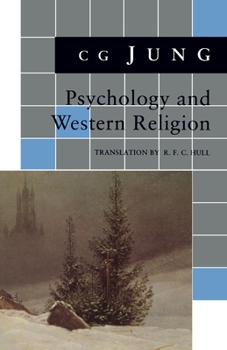Psychology and Western Religion: (From Vols. 11, 18 Collected Works)
Select Format
Select Condition 
Book Overview
Extracted from Volumes 11 and 18. This selection of Jung's writings brings together a number of articles that are necessary for the understanding of his interpretation of the religious life and development of Western man: views that are central to his psychological thought.
Format:Paperback
Language:English
ISBN:0691018626
ISBN13:9780691018621
Release Date:December 1984
Publisher:Princeton University Press
Length:320 Pages
Weight:0.85 lbs.
Dimensions:0.8" x 5.5" x 8.5"
Customer Reviews
2 ratings
The debate continues
Published by Thriftbooks.com User , 15 years ago
I find this book interesting because many of the issues Jung analyzed and debated here is still of contemporary interest. Firstly it is the Christian Trinity doctrine (and later the incorporation of Virgin Mary as a possible fourth element). For Jung, the unconscious and its archetypes (including God-image) is amoral and holistic, therefore, can't guarantee to be 100% good (like Christian God) or 100% bad (like Christian Devil). Unlike the Christian dogma, eastern religions do not ask for perfection, and hence more respectful to the unconscious. Perfection belongs to the domain of consciousness. Because of its compensatory nature with the unconscious, disregard to the reality of the unconscious is likely to backfire with psycho-pathological problems. According to Jungian analysis, the inclusion of Virgin Mary (mother earth) should be considered a step forward, but the tension between conscious and unconscious remains. And the debate continues. Another debate concerns the issue "Psychotherapists or the Clergy" (an article in the book, page 195). With the progress of science and the triumph of consciousness in delivering to mankind a better and better world (incidentally Jung praised the good contribution of consciousness in the west vs-a-vs the east, and he categorically said copying the east is NOT the proper/correct spiritual route), the need for spirituality has become an important pursuit for the west - if not in our Universities, then certainly at our Shopping Malls! Needless to say our Christian groups and leaders have to compete with the psychotherapists in addition to other religious or spiritual groups in this big business of spiritual healing. Hence the debate continues.
Jung on Christianity
Published by Thriftbooks.com User , 24 years ago
The psychology of Carl Jung (1875-1961) is the system of psychology most receptive to the beneficial influence of religion in a person's life. In this selection of writings, mostly from Volume 11 of the Collected Works, Jung focuses on the strengths and limitations of western religion. For Jung, western religion is the organic unity of Church Christianity and its "shadows": Gnosticism and alchemy. Two thirds of the book consist of two long essays, "A Psychological Approach to the Dogma of the Trinity" (1942) and "Transformation Symbolism in the Mass" (1942). In these essays, as well as the shorter ones, Jung walks a fine line. His analysis could scandalize a traditional (and otherwise unimaginative) Christian believer; at the same time, Jung's profound respect for the depth and wisdom of Christianity stands in stark contrast to the flippant disregard some elements of the New Age movement pay it. For Jung, Christianity (with its shadows) is an organic system that contains, though sometimes in obscure ways, everything needed for psychology growth and individuation. For anyone who was raised Christian but who now finds Christianity unaccountably unsatisfactory, this book could catalyze renewed spiritual explorations in any one of number of directions.






